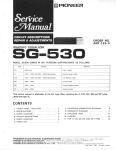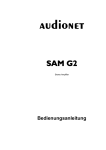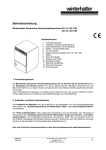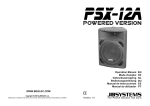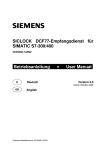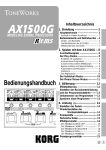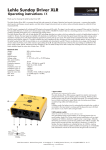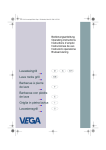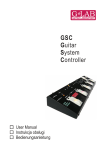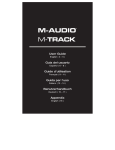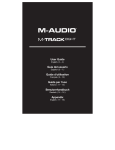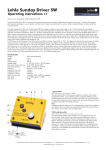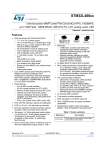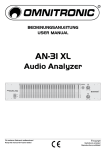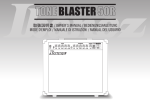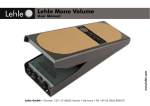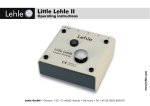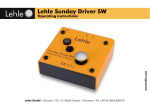Download Lehle D.Loop SGoS Manual&Uses V1.0.cdr
Transcript
Lehle D.Loop SGoS Lehle Operating Instructions Bedienungsanleitung 8 7 6 5 Lehle Gitarrentechnik Burkhard Georg Lehle 4 3 2 1 Im Hundsbusch 11 D-46562 Voerde tel fax mobile +49.(0)2855.850070 +49.(0)2855.850071 +49.(0)171.1403992 [email protected] http://www.lehle.com 9 10 11 12 13 Screw Schraube Bottomplate of switch Bodenplatte des Schalters 13 Base-plate Grundplatte Washer U-Scheibe Spacer Distanzstück Thank you for purchasing the Lehle D.Loop SGoS! The Lehle D.Loop SGoS is a fully programmable Effect Looper/ Switcher with two separate True-Bypass loops routed via gold-plated relays. The effect loops make it possible to switch effect units or preamps into the signal path as if they were connected directly in the line between the guitar and the amplifier. When the loops are off, the instrument signal is routed directly via the gold-plated relay contacts without any modification of the output from the Lehle D.Loop SGoS to the amplifier. The exclusive use of gold-plated relay contacts in the signal path means that signal impedance (and therefore the sound) and, above all, the unique interaction between the instrument and the amplifier, are not changed. If necessary, the high-end buffer amp of the Lehle D.Loop SGoS can be switched in to refresh the signal or (with the gain controller turned up) boost it up to +12dB. The Lehle D.Loop can be controlled and synchronized with other Lehle SGoS Switchers via MIDI. Danke für den Erwerb des Lehle D.Loop SGoS! Der Lehle D.Loop SGoS ist ein voll programmierbarer EffektLooper/Switcher mit zwei unabhängigen, echten True-Bypass Loops über goldkontaktierte Relais. Mit den beiden Effektloops lassen sich Effektgeräte oder Preamps in den Signalweg schalten, so als wären sie direkt zwischen Gitarre und Verstärker miteinander verbunden. Sind die Loops deaktiviert geht das Signal des Instrumentes ohne jegliche Beeinflussung direkt über die goldkontaktierten Relais auf den Ausgang des Lehle D.Loop SGoS zum Verstärker. Durch die konsequente Verwendung von goldkontaktierten Relais im Signalweg ändert sich die Impedanz des Signals und damit der Sound und vor allem die einzigartige Interaktion zwischen Instrument und Verstärker nicht. Der zuschaltbare High End Bufferamp des Lehle D.Loop SGoS kann bei Bedarf das Signal auffrischen oder bei aufgedrehtem Gainregler bis +12dB boosten. Der Lehle D.Loop kann per MIDI angesteuert und mit den anderen Lehle SGoS Switchern vernetzt werden. Technical Data 2 Technische Daten 2 General Description 2 Allgemeine Beschreibung 2 Restoring default state 3 Herstellung des Ausgangszustandes 3 Using the Lehle D.Loop SGoS in stereo 3 Lehle D.Loop SGoS stereo benutzen 3 The MIDI capabilities of the Lehle D.Loop SGoS 4 Die MIDI Eigenschaften des Lehle D.Loop SGoS 4 Networking of the Lehle D.Loop SGoS with other Lehle SGoS Switchers 4 Vernetzen des Lehle D.Loop SGoS mit anderen Lehle SGoS Switchern 5 Uses 5 Anwendungsbeispiele 5 Enjoy Cool Switching! Viel Spaß beim Schalten! Technical Data Weight: Length: Width: Overall Height: Voltage: max Current: 735 g 4” 6.1” 1.9” 9-20 V DC 195 mA + Technische Daten Gewicht: Länge: Breite: Höhe über alles: Spannungsbereich: Max. Stromaufnahme: _ General Description 1 The input signal (guitar, bass, etc.) enters via this socket. This signal is available without modification on the output when the Lehle D.Loop SGoS is off. When the buffer and both loops are on, the signal firstly passes through the buffer, then through Loop A and, finally, through Loop B. 2 This is the Send socket for Loop A. Connect the input of an effect unit to be operated in Loop A, or the input of an amplifier (if you want to route your signal via multiple amplifiers using the Lehle D.Loop SGoS ) to this socket. The green lamp indicates when Loop A is active (i.e., when the input signal is being routed via Loop A). 3 The output of the effect unit from Loop A is connected here to the Return socket. 4 Loop B behaves the same as Loop A (see Items 2 and 3). The Lehle D.Loop SGoS permits extremely flexible use: The Send sockets are outputs on which the signal is present when the particular loop is active. Together with the standard output (6), the Lehle D.Loop SGoS therefore has three switchable stereo outputs. This permits various options, such as routing of your signal via three different amplifier input stages, for example (e.g. active monitors, various end stages, various amplifiers, etc.). 5 The Return sockets of the loops take the form of inputs, the signal of which is processed if the particular loop is active. When the input socket (1) is included, the D.Loop thus has three stereo inputs. These can also be used, for example, to switch three different signal sources to the output (three guitars, three keyboards, etc.). It is also possible, of course, to mix the functions of the loops. 6 This is the otput of the Lehle D.Loop SGoS. The output and the Sends of Loop A and Loop B are set to low impedance during switching, in order to suppress the natural switching noise of the gold-plated relay contacts. This is accomplished under software control by means of the built-in microcontroller. This circuit has absolutely no influence on the sound during normal operation, i.e., when no switching is taking place, since it is not located in the signal path. 7 The Lehle D.Loop SGoS requires an 9 to 20V power supply . The supply voltage is internally filtered and stabilized to guarantee trouble-free operation. A thermal cut-out trips the unit automatically if a short-circuit occurs. The correct connector for the power-supply socket of the Lehle D.Loop SGoS is included in the pack. This can be soldered on to the power adapter of your choice. It is advisable to use a separate power adapter or an outlet on a multiple outlet power adapter with electrically isolated outlets for the Lehle D.Loop SGoS, but with no other loads connected to it, to avoid interference noise during operation or when switching. 8 This jack socket is required for networking of the Lehle D.Loop SGoS with other Lehle SGoS Switchers and to transmit or receive MIDI program-change commands. See the "MIDI capabilities of the Lehle D.Loop SGoS" section for more details. 9 The high-intensity LEDs under the lenses clearly indicate the Switching State of Loop A, B or the Buffer even under stage lighting. 10 These programming buttons are used in Mode 2 and 3 (programmable mode) to assign the switching states to the particular foot-switch. If a MIDI program-change command has previously been received, the programming buttons can be used to store switching states corresponding to the particular program-change command (e.g. Loop A and Loop B simultaneously for Program-change Command No. 10). Irrespective of this, Loop A, B and the Buffer can be switched on and off by pressing the relevant programming buttons. Storing programs is extremely simple: If Loop A, B or the Buffer is OFF in Mode 2 or 3 or after reception of a MIDI program-change command, and should be ON, press the programming button and keep it pressed until the LED flashes and then stays on automatically. If the particular output should be OFF and D.Loop it is in fact ON in Mode 2 or 3 or after receiving a program-change command, press the programming button and keep it pressed until the LED flashes and then remains OFF automatically. These assignments are stored in the built-in Eeprom and are not lost even after the unit is switch off and on again. 11 This is the gain controller for the switchable buffer. The blue LED indicates when the buffer is active. The buffer is equipped with an extremely high-impedance JFET input stage and has two functions: On the one hand, it reduces the impedance of the signal and, on the other hand, it also boosts the signal. The buffer as an impedance transformer: The buffer acts purely as an impedance transformer when the gain controller is set clockwise until the stop is reached (around the "7 o'clock" position). True Bypass effects do not modify the high impedance of the magnetic pickups normally fitted to electric guitars and electric basses, since this would generally also harm the sound and the interaction with the amplifier. In certain cases, however, refreshing the sound with a low impedance may be just the desired effect for instance, if instrument leads are unavoidably long, and/or where a larger number of effects are used. In such cases, the Lehle D.Loop SGoS makes it possible to switch the integrated buffer amp into the signal path as an impedance transformer. The buffer as a booster: The buffer will amplify the signal when the gain controller is switched clockwise. This makes it possible to slightly distort tube amplifiers, preamps and distortion pedals. To make the distortion harmonic, the buffer amplifies the treble frequencies less as amplification rises, and the result is a silky warm, harmonious-sounding distortion. 12 The foot-switches with their virtually indestructible mechanisms actuate momentary switches inside the switcher which trip Loop A, B or the Buffer, depending on the mode selected. 9-20V Buffer R Loop B Loop A S R Loop A S Loop B -2- 735 g 10,3 cm 15,6 cm 4,7 cm 9-20 V DC 195 mA + _ Allgemeine Beschreibung 1In diese Buchse kommt das Eingangssignal (Gitarre, Bass etc.). Ist der Lehle D.Loop SGoS ohne Stromversorgung, liegt dieses Signal unverfälscht am Ausgang an. Sind Buffer und beide Loops eingeschaltet, geht das Signal erst durch den Buffer, dann Loop A und als letztes Loop B. 2 Dies ist die Send Buchse von Loop A. Hiermit verbinden Sie den Eingang eines Effektgerätes, das im Loop A betrieben werden soll oder den Eingang eines Verstärkers, wenn Sie mit dem Lehle D.Loop SGoS mehrere Verstärker ansteuern wollen. Ist Loop A aktiv - das Eingangssignal wird also durch Loop A geroutet - zeigt die grüne Leuchte das an. 3 In die Return-Buchse kommt hier der Ausgang des Effektgerätes von Loop A. 4 Loop B verhält sich wie Loop A (siehe Punkt 2 und 3). Der Lehle D.Loop SGoS ist sehr flexibel einsetzbar: Die Send-Buchsen sind Ausgänge, auf denen das Signal anliegt, wenn die jeweiligen Loops aktiv sind. Zusammen mit dem regulären Ausgang (6) verfügt der Lehle D.Loop SGoS also über drei schaltbare Ausgänge in stereo. Das macht Anwendungen möglich wie z.B. das wahlweise Ansteuern von drei verschiedenen Verstärkereingangsstufen (z. B. Aktivmonitore, verschiedene Endstufen, verschiedene Verstärker etc.) 5 Die Return-Buchsen der Loops bilden Eingänge, deren Signale verarbeitet werden, wenn die jeweiligen Loops aktiv sind. Mit der Eingangsbuchse (1) verfügt der Lehle D.Loop SGoS also über drei Eingänge in stereo. Diese können z.B. auch benutzt werden, um drei verschiedene Signalquellen auf den Ausgang zu schalten (drei Gitarren, drei Keyboards etc.). Natürlich lassen sich die Funktionen der Loops auch mischen. 6 Hier liegt das Ausgangssignal an. Um das natürliche Umschaltgeräusch der goldkontaktierten Relais zu dämpfen, werden während des Umschaltens die Ausgänge und Sends von Loop A und B niederohmig gemacht. Dies geschieht softwaregesteuert mit Hilfe des eingebauten Micro-Controllers. Während des normalen Betriebs, in der umschaltfreien Zeit, beeinflusst diese Schaltung den Sound in keinster Weise, da sie nicht im Signalweg liegt. 7 Der Lehle D.Loop SGoS benötigt eine Stromversorgung zwischen 9-20V . Um einen einwandfreien Betrieb zu garantieren, wird die Versorgungsspannung intern gefiltert und stabilisiert. Ein Überhitzungsschutz schaltet im Falle eines Kurzschlusses das Gerät automatisch ab. Ein einwandfrei passender Stecker für die Stromversorgungsbuchse des Lehle D.Loop SGoS liegt bei. Bei Bedarf kann dieser an das Netzteil der Wahl angelötet werden. Um Störgeräusche beim Schalten oder im Betrieb zu vermeiden, ist es sinnvoll, ein eigenes Netzteil oder einen Ausgang eines Mehrfachnetzteiles mit galvanisch getrennten Ausgängen für den Lehle D.Loop SGoS zu benutzen, ohne dass damit noch andere Geräte mit angeschlossen sind. 8 Diese Klinkenbuchse wird benötigt um den Lehle D.Loop SGoS mit anderen Lehle SGoS Switchern zu vernetzen oder MIDI-Programchange Befehle zu empfangen bzw. zu senden. Mehr dazu im Kapitel: „Die MIDI Eigenschaften des Lehle D.Loop SGoS“ 9 Die leuchtstarken Leuchtdioden unter den Lichtleitern lassen selbst bei Scheinwerferlicht die Schaltzustände für Loop A, B oder den Buffer erkennen. 10 Diese Programmtaster dienen dazu im Betriebsmodus 2 und 3 (den programmierbaren Modi) die Schaltzustände dem jeweiligen Fußtaster zuzuordnen. Wenn vorher ein MIDI-Programchange Befehl empfangen wurde, kann man mit den Programmtastern Schaltzustände passend zu dem jeweiligen Programchange Befehl abspeichern (z.B. Loop A und Loop B gleichzeitig für Programchange Nr. 10). Unabhängig davon kann man über die Programmtaster die Loops A, B und den Buffer durch Drücken der jeweiligen Taster an- bzw. ausschalten. Das Abspeichern ist sehr einfach: Wenn Loop A, B oder der Buffer im Betriebsmodus 2 und 3 oder nach empfangenem MIDI-Programchange Befehl aus ist und an sein soll, drückt man den Programmtaster und hält ihn solange gedrückt, bis die LED blinkt und dann von selbst an bleibt. Soll der jeweilige Ausgang aus sein, und dieser D.Loop Ausgang ist im Modus 2 und 3 oder nach empfangenem Programchange an, drückt man den Programmtaster und hält ihn solange gedrückt, bis die LED blinkt und dann von selbst aus bleibt. Diese Zuordnungen werden in dem eingebauten Eeprom gespeichert und bleiben nach aus- und anschalten des Gerätes erhalten. 11 Dies ist der Gainregler für den zuschaltbaren Buffer des Lehle D.Loop SGoS. Ist der Buffer aktiv, wird dies durch die blaue LED angezeigt. Der Buffer ist mit einer sehr hochohmigen JFET-Eingangsstufe ausgerüstet und hat zwei Funktionen: einerseits dient er dazu, die Impedanz des Signals zu verringern oder das Signal zu boosten. Der Buffer als Impedanzwandler Steht der Gainregler gegen den Uhrzeigersinn gedreht am Anschlag (~7 Uhr), arbeitet der Buffer als reiner Impedanzwandler. Echte True Bypass-Effekte verändern nicht die hohe Impedanz von magnetischen Pickups, wie sie üblicherweise bei E-Gitarren und Bässen eingesetzt werden, weil dadurch meistens auch der Sound und die Interaktion mit dem Verstärker beeinträchtigt wird. In bestimmten Fällen kann es aber gerade ein gewünschter Effekt sein, mit niedriger Impedanz den Sound wieder aufzufrischen, z. B. wenn sehr lange Kabellänge benötigt oder viele Effekte eingesetzt werden. Der Lehle D.Loop SGoS bietet hier die Möglichkeit, den integrierten Bufferamp Impedanzwandler in den Signalweg zu schalten. Der Buffer als Booster Dreht man nun den Gainregler im Uhrzeigersinn verstärkt der Buffer das Signal. Damit lassen sich Röhrenverstärker, Preamps oder Verzerrer leicht übersteuern. Damit die Übersteuerung harmonisch klingt verstärkt der Buffer mit steigender Verstärkung weniger Höhen. Das Resultat ist eine seidig warme und harmonisch klingende Übersteuerung. 12 Die Fußtaster mit ihrer nahezu unzerstörbaren Schaltmechanik betätigen im Inneren des Switchers Taster, die je nach Betriebsmodus Loop A,B oder den Buffer auslösen. 9-20V Buffer R Loop B Loop A S R Loop A S Loop B Mode selection All three foot-switches must be pressed simultaneously to change the mode. When the buttons are kept pressed, the LEDs will start to flash in sequence. After around 3 sec., one LED will remain on longer. A Lehle D.Loop SGoS in Mode 1 will be in Mode 2 after this mode-changing operation. From there, it can be switched to Mode 3 and from Mode 3 back to Mode 1. R 9-20V Loop B S R Loop A Buffer Loop A S Loop B D.Loop Mode 1: Blue LED (left) on continuously Mode 2: Green LED (center) on continuously Mode 3: red LED (right) on continuously The currently selected mode is backed-up in an Eeprom even after the Lehle D.Loop SGoS has been switched off. Ring Tip S R Loop A Loop A Loop A S Loop B Betriebsmodus 1: blaue LED (links) bleibt an Betriebsmodus 2: grüne LED (mitte) bleibt an Betriebsmodus 3: rote LED (rechts) bleibt an Der Betriebsmodus bleibt auch nachdem der Lehle D.Loop SGoS nicht mehr in Betrieb ist, in einem Eeprom gespeichert. Betriebsmodus 1: Wird der linke Fußtaster betätigt, ist der Buffer aktiv, wird der Fußtaster noch einmal betätigt, ist er deaktiviert. Loop A wird über den mittleren Fußtaster und Loop B über den rechten Fußtaster an- bzw. abgeschaltet. Im Grundzustand arbeitet der Lehle D.Loop SGoS in dieser Betriebsart. Betriebsmodus 2 (programmierbarer Modus): Hier lassen sich zu jedem Fußtaster eine beliebige Kombination aus Loop A, B oder dem Buffer programmieren (siehe Punkt 10 - Programmtaster). Wird der gedrückte Fußtaster ein zweites mal betätigt, gehen Loop A, Loop B oder der Buffer aus. Der Lehle D.Loop SGoS schaltet auf True-Bypass. Betriebsmodus 3 (programmierbarer Modus): Dies ist der Betriebsmodus, den man benötigt, um mehrere Lehle SGoS Switcher miteinander zu vernetzen. Dieser Modus funktioniert von der Programmierung her wie Modus 2, allerdings ohne True-Bypass nach zweimaligem Schalten. Sobald in diesem Modus ein Fußtaster betätigt wurde, sendet der Lehle D.Loop SGoS einen MIDI-Programchange Befehl über die MIDI-Buchse (8). 13 Der Boden des Lehle D.Loop SGoS lässt sich problemlos befestigen. Zuerst müssen die vier Gehäuseschrauben des Deckels geöffnet werden, dann kann der Boden des Gerätes mit Hilfe der zwei mitgelieferten Schrauben, den Unterlegscheiben und den Distanzstücken auf eine Grundplatte angeschraubt werden. Masse Ring Tip Das Stereosignal besteht aus zwei unabhängigen Signalen, die an der Spitze (Tip) und am Ring getrennt anliegen. Die Masse ist mit dem dahinter liegenden Teil der Buchse verbunden. Wenn man den Lehle D.Loop SGoS stereo oder mit symmetrischen Signalen betreibt, muss darauf geachtet werden, dass alle Stecker am Eingang, Ausgang sowie Send und Return als Stereostecker ausgeführt sind. Liegt am Eingang des Lehle D.Loop SGoS nur ein Monosignal an, sollen aber trotzdem in den Loops Stereo-Effekte benutzt werden, so muss ein Adapter oder Kabel benutzt werden, das einen Stereo-Stecker auf der Seite des Lehle D.Loop SGoS hat, bei dem das Monosignal gleichzeitig an Tip & Ring liegt. Würde man an einer Stelle doch einen Monoklinkenstecker benutzen, wäre über die Stereoklinkenbuchse der Ring mit der Masse verbunden. Das ließe den Stereokanal, der am Ring liegt, verstummen. Herstellung des Ausgangszustandes Bevor der Stecker für die Stromversorgung (8) eingesteckt wird, müssen alle drei Fußtaster gedrückt sein. S 9-20V Buffer R Lehle D.Loop SGoS stereo benutzen Alle Klinkenbuchsen, der komplette Signalweg sowie der Bufferamp des Lehle D.Loop SGoS sind in stereo ausgeführt. Dadurch lassen sich Stereo-Signale oder symetrische Signale verarbeiten. Es können aber auch problemlos Mono-Signale mit dem Lehle D.Loop SGoS geschaltet werden. Stereoklinke: Restoring default state All three foot-switches must be pressed before the power-supply connector (8) is inserted. Loop B S D.Loop The stereo signal consists of two independent signals which are present separately on both the tip and the ring of the jack-plug. Ground is connected to the sleeve. It must be ensured when operating the Lehle D.Loop SGoS in stereo or with symmetrical signals that only stereo plugs are used for the input, the Send output and the Return. If only a mono signal is present on the input of the Lehle D.Loop SGoS but stereo effects are nonetheless to be used in the Loops, an adapter or lead with a stereo plug on the end plugged into the Lehle D.Loop SGoS with the mono signal on the tip and the ring simultaneously must be used. If a mono jack-plug is used at any point, the ring would be connected with Ground via the stereo jack-socket, which would mute the stereo channel on the ring. R Loop B Loop A Buffer Using the Lehle D.Loop SGoS in stereo All jack sockets, the entire signal path and the buffer amp of the Lehle D.Loop SGoS are stereo. This makes it possible to process stereo or symmetrical signals. Mono signals can also be switched using the Lehle D.Loop SGoS without any difficulty, too. Stereo jack-plug: 9-20V R 9-20V Mode 1: Loop A is active when the center foot-switch is pressed; it is deactivated if the footswitch is pressed again. Loop B can be switched ON and OFF using the right-hand foot-switch, and the Buffer using the left-hand foot-switch. The Lehle D.Loop SGoS operates in this mode in default condition. Mode 2 (programmable mode): In this mode, any combination of Loop A, Loop B and the buffer can be programmed for each foot-switch (see Item 10, Programming Buttons). Loop A, Loop B or the buffer are switched off when the foot-switch is pressed a second time. The Lehle D.Loop SGoS then switches to True Bypass. Mode 3 (programmable mode): This is the mode needed to network several Lehle SGoS Switchers with one another. As far as programming is concerned, this mode functions like Mode 2, but with no True Bypass after the second switching. The Lehle D.Loop SGoS transmits a MIDI program-change command via MIDI Socket (8) as soon as a foot-switch is actuated in this mode. 13 The base of the Lehle D.Loop SGoS is designed for trouble-free fixing. The four screws holding the cover in place must firstly be opened and the base of the unit can then be screwed to a base-plate using the two screws, washers and spacers supplied. Ground (Sleeve) Umschalten des Betriebsmodus Zum Umschalten der Betriebsmodi müssen alle drei Fußtaster gleichzeitig gedrückt werden. Hält man die Knöpfe gedrückt, fangen die LEDs an nacheinander zu blinken. Nach etwa 3 sec bleibt eine LED länger an. Befindet sich der Lehle D.Loop SGoS im Betriebsmodus 1, ist er nach Umschalten des Modus in Betriebsart 2. Von da lässt er sich umstellen auf Modus 3. Nach Betriebsart 3 kommt man wieder auf den Modus 1. R Loop B S R Loop A S Loop B Loop A Buffer Loop B D.Loop D.Loop The power-supply connector should be inserted while the foot-switches are kept pressed. 9-20V R Loop B Loop A Buffer S R Im gedrückten Zustand wird der Stecker für die Stromversorgung eingesteckt. S 9-20V Loop B Buffer Loop A D.Loop R Loop B Loop A S R Loop A S Loop B D.Loop The LEDs will all flash simultaneously for around 7 sec. and then go off automatically. The foot-switches can then be released. The Lehle D.Loop SGoS is now in default state. -3- Ca. 7 sec blinken die LEDs gleichzeitig, bis sie von selbst ausgehen. Danach können die Fußtaster losgelassen werden. Der Lehle D.Loop SGoS befindet sich jetzt im Ausgangszustand. Die MIDI Eigenschaften des Lehle D.Loop SGoS Der Lehle D.Loop SGoS empfängt in allen 3 Betriebsmodi MIDI-Programchange Befehle. Um andere MIDI-fähige Geräte anzuschließen, muss ein Kabel (Adapter) benutzt werden, dass folgende Belegung hat: The MIDI capabilities of the Lehle D.Loop SGoS The Lehle D.Loop SGoS is able to receive MIDI program-change commands in every operation mode. A lead (adapter) with the following pin assignments must be used to connect other MIDI-capable devices: 5 2 4 5 2 Passende Kabel mit verschiedenen Kabellängen können unter www.lehle.com bestellt werden. Der Lehle D.Loop SGoS sendet im Betriebsmodus 3 fest eingestellt auf MIDI-Kanal 15. Corresponding leads of various convenient lengths can be ordered from www.lehle.com. The Lehle D.Loop SGoS transmits on MIDI Channel 15 in Mode 3 (permanent setting). Selecting the MIDI reception channel In its default state, the Lehle D.Loop SGoS receives on all MIDI channels simultaneously (= Omnimode). It is also possible to select a specific channel on which the Lehle D.Loop SGoS is to receive. The left-hand foot-switch must be pressed before the power-supply connector (7) is inserted. MIDI-Empfangskanal festlegen Im Ausgangszustand empfängt der Lehle D.Loop SGoS auf allen MIDI-Kanälen gleichzeitig (= Omnimodus). Man kann aber auch einen bestimmten Kanal einstellen, auf dem der Lehle D.Loop SGoS empfängt. Bevor der Stecker für die Stromversorgung (7) eingesteckt wird, muss der linke Fußtaster gedrückt sein. 9-20V 9-20V R Loop B S R Loop A S R Loop A Loop A S Loop B D.Loop Im gedrückten Zustand wird der Stecker für die Stromversorgung eingesteckt. The power-supply connector should be inserted while the left-hand foot-switch remains pressed. 9-20V R Loop B S R Loop A R Loop B S R Loop A S S Loop A Buffer Loop A Buffer Loop B Loop B D.Loop 9-20V R S Buffer Loop A Buffer 4 Loop B Loop B D.Loop D.Loop The blue and green LEDs will now flash in sequence. If the left-hand foot-switch is now released after the first flash of the blue LED, the Lehle D.Loop SGoS will only receive on MIDI Channel 1. Select MIDI Channel 2 by waiting until the green LED flashes. This is followed by MIDI Channel 3 (blue) and MIDI Channel 4 (green). The whole procedure can be repeated up to MIDI Channel 16. Omnimodus can be selected for Lehle D.Loop SGoS reception by keeping the left-hand foot-switch pressed until the green and blue LEDs are on simultaneously. Switching states can be assigned without restriction to any individual program-change command using the programming buttons (10), irrespective of the mode selected. Jetzt blinken die blaue und grüne LED nacheinander. Lässt man den linken Fußtaster nach dem ersten Blinken der blauen LED los, empfängt der Lehle D.Loop SGoS nur noch auf MIDI-Kanal 1. Wartet man des Aufleuchten der grünen LED ab, ist der MIDI-Kanal 2 eingestellt. Danach kommt MIDI-Kanal 3 (blau) und MIDI-Kanal 4 (grün). Das Ganze geht bis MIDI-Kanal 16. Hält man den linken Fußtaster solange gedrückt, bis die grüne und blaue LED gleichzeitig angehen, empfängt der Lehle D.Loop SGoS wieder im Omnimodus. Unabhängig vom Betriebsmodus können über die Programmtaster (10) Schaltzustände jedem einzelnen Programchange frei zugeordnet werden. Networking of the Lehle D.Loop SGoS with other Lehle SGoS Switchers The Lehle D.Loop SGoS can be networked with other Lehle SGoS Switchers via the MIDI socket (9). The switchers must be connected using a stereo jack lead for this purpose: Vernetzen des Lehle D.Loop SGoS mit anderen Lehle SGoS Switchern Der Lehle D.Loop SGoS kann mit anderen Lehle SGoS Switchern über die MIDIBuchse (8) vernetzt werden. Dazu müssen die Switcher mit einem Stereoklinkenkabel verbunden werden: 9-20V R Loop B Loop A Buffer S R S 9-20V Loop B Buffer Loop A D.Loop R Loop B Loop A S R Loop A S Loop B D.Loop The Lehle D.Loop SGoS and the other Lehle SGoS Switchers must first be set to programmable mode (12). Switching states on the Lehle D.Loop SGoS can be assigned without restriction using the programming buttons (10) when a Lehle D.Loop SGoS foot-switch is pressed. The Lehle D.Loop SGoS simultaneously transmits a MIDI program-change command to the other Lehle SGoS Switchers. Switching states corresponding to this MIDI program-change command can also be programmed on the other Lehle SGoS Switchers. The Lehle SGoS Switcher receives a MIDI program-change command if a footswitch on one of the connected Lehle SGoS Switchers is pressed. Any combinations of Loops or Buffer can, again, be assigned on the Lehle D.Loop SGoS for this MIDI program-change command using the programming button (10). Several effect loops can, for example, thus be switched simultaneously with one step, corresponding to a combination of various amps. Up to three Lehle D.Loop SGoS units can be networked with one another. -4- Der Lehle D.Loop SGoS und die anderen Lehle SGoS Switcher müssen erst in den programmierbaren Modus gebracht werden (12). Wird ein Fußtaster des Lehle D.Loop SGoS betätigt, können dazu Schaltzustände auf dem Lehle D.Loop SGoS mit Hilfe der Programmtaster (10) frei zugeordnet werden. Der Lehle D.Loop SGoS gibt dabei gleichzeitig einen MIDI-Programchange Befehl an die anderen Lehle SGoS Switcher ab. Passend zu diesem MIDI-Programchange Befehl können Schaltzustände auf den anderen Lehle SGoS Switchern programmiert werden. Wird ein Fußtaster auf einem der angeschlossenen Lehle SGoS Switcher betätigt, empfängt der Lehle D.Loop SGoS einen MIDI-Programchange Befehl. Zu diesem MIDIProgramchange Befehl können auf dem Lehle D.Loop SGoS wiederum freie Kombinationen von Amps über die Programmtaster (10) zugeordnet werden. Damit lassen sich z.B. mehrere Effektloops gleichzeitig mit einem Step passend zu einer Kombination verschiedener Amps schalten. Es können bis zu drei Lehle D.Loop SGoS miteinander vernetzt werden. Damit allen über die MDI-Buchse (8) angeschlossenen Geräten klar ist, von welchem Gerät gerade ein Programchange gesendet wurde, müssen die Lehle D.Loop SGoS für diese Betriebsartvorbereitet werden. Bevor der Stecker für die Stromversorgung (7) eingesteckt wird, muss der mittlere Fußtaster gedrückt sein. The Lehle D.Loop SGoS units must be prepared for this mode, in order that it is clear to all units connected via MIDI socket (8) from which unit a program-change command has just been transmitted. The center foot-switch must be pressed before the power-supply connector (7) is inserted. 9-20V R Loop B S R Loop A 9-20V R R Loop A Buffer Loop A Buffer S Loop B Loop A S S Loop B Loop B D.Loop D.Loop Im gedrückten Zustand wird der Stecker für die Stromversorgung eingesteckt. The power-supply connector should be inserted while the center foot-switch remains pressed. 9-20V 9-20V R Loop B S R Loop A Loop A Loop B S R Loop A S S Loop A Buffer Buffer R Loop B D.Loop Loop B D.Loop The red LED will illuminate first. When the center foot-switch is now released, the Lehle D.Loop SGoS transmits MIDI Program-change Commands 11, 12 and 13 (this is also equivalent to the default status). When the center foot-switch is kept pressed until the red and green LEDs illuminate, the Lehle D.Loop SGoS will transmit MIDI program-change Commands 14, 15 and 16. When all LEDs illuminate, the Lehle D.Loop SGoS transmits MIDI Program-change Commands 17, 18 and 19. The three Lehle D.Loop SGoS units must now be set in such a way that the first unit transmits MIDI Program-change Commands 11, 12 and 13. The second transmits MIDI Program-change Commands 14, 15 and 16 and the third MIDI Programchange Commands 17, 18 and 19. Setting of the MIDI program-change commands transmitted is not necessary if only units of different types (e.g. one Lehle D.Loopl SGoS and one Lehle D.Loop SGoS) are networked. Setting is also not necessary if two Lehle D.Loop SGoS units are connected in this way without an additional Lehle SGoS Switcher. Zuerst leuchtet die rote Leuchtdiode. Lässt man nun den mittleren Fußtaster los, sendet der Lehle D.Loop SGoS die MIDI-Programchange Befehle 11, 12 und 13 (das entspricht auch dem Ausgangszustand). Hält man den mittleren Fußtaster so lange gedrückt, bis die rote und grüne LED leuchten, sendet der Lehle D.Loop SGoS die MIDI-Programchange Befehle 14, 15 und 16. Wenn alle LEDs leuchten, sendet der Lehle D.Loop SGoS die MIDI-Programchange Befehle 17, 18 und 19. Die drei Lehle D.Loop SGoS müssen nun so eingestellt werden, dass der erste die MIDIProgramchange Befehle 11, 12 und 13 sendet. Der zweite sendet 14, 15 und 16 und der dritte die MIDI-Programchange Befehle 17, 18 und 19. Die Umstellung der gesendeten MIDI-Programchange Befehle ist nicht nötig, wenn man nur verschiedene Geräte (z.B. ein Lehle Dual SGoS und ein Lehle D.Loop SGoS) vernetzt. Werden auf diese Weise zwei Lehle D.Loop SGoS verbunden ohne einen weiteren Lehle SGoS Switcher ist die Umstellung auch nicht nötig. Lehle D.Loop SGoS Uses Anwendungsbeispiele Effectlooper (1 Instrument, 2 Effects & 1 Amp) Connection of units Anschluss der Geräte: Input: Instrument Send A: In Effect A Eingang Effekt A Return A: Out Effect A Ausg. Effekt A Send B: In Effect B Eingang Effekt B Return B: Out Effect B Ausg. Effekt B Output: Amp Verstärker Preamplooper (1 Instrument, 2 Preamps & 1 Amp) Connection of units Anschluss der Geräte: Input: Instrument Send A: In Preamp A Eing. Preamp A Return A: Out Preamp A Ausg. Preamp A Send B: In Preamp B Eing. Preamp B Return B: Out Preamp B Ausg. Preamp B Output: Amp Verstärker -5- Preamplooper (1Instrument, 1Preamp & 1Amp) Connection of units Anschluss der Geräte: Input: Instrument Send A: In Effect A Eingang Effekt A Return A: Out Effect A Ausg. Effekt A Send B: In Amp Eingang Verstärker Return B: Send Amp Send Verstärker Output: Return Amp Return Verstärker Instrumentswitcher/ Effectlooper (2 Instruments, 1 Effect & 1 Amp) Connection of units Anschluss der Geräte: Input: Instrument 1 Send A: not connected bleibt unbenutzt Return A: Instrument 2 Send B: In Effect Eingang Effekt Return B: Out Effect Ausgang Effekt Output: Amp Verstärker -6-







